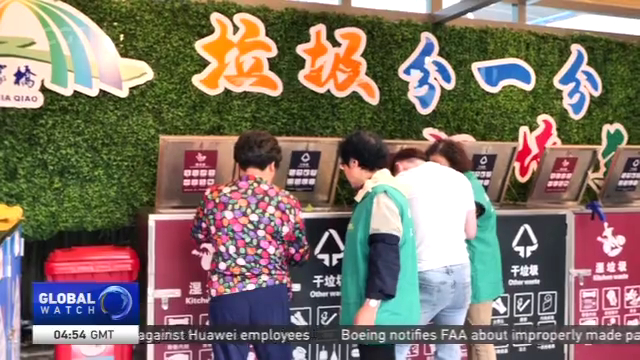
14:07, 03-Jun-2019
China's War on Waste: Shanghai rolls out new garbage-sorting initiative
Updated
09:41, 04-Jun-2019
03:00

Sort your trash, or face a fine. From July 1st, China's largest city will start enforcing new regulations that require all individuals and businesses to properly separate their rubbish. CGTN's Xu Mengqi looks at how Shanghai is hoping to enforce this ambitious green revolution.
If you ever wondered what a megacity dump is like. Well, you're looking right into the coal-face of one now.
This is Laogang, a massive waste-processing complex that takes in more than 10,000 tons, or about 70 percent of the general waste Shanghai produces, every day. But for a metropolis with 24 million people, this is still not enough.
QI YUMEI, DEPUTY DIRECTOR SHANGHAI ENVIRONMENTAL SANITATION DEPT. "Phase 4 of the Laogang landfill was scheduled to last till 2024, but without expansion, we would have exhausted the original storage capacity this year."
As part of a solution to the problem, the city government has been encouraging its residents to sort their garbage, so what can be reused and recycled doesn't turn up at Laogang.
So how does it work in practice?
XU MENGQI SHANGHAI "Traditionally in Shanghai's neighborhoods, each residential building or even each floor has waste bins like these and you can dispose of your garbage anytime you want. But now, the ubiquitous bins are to be retracted and residents have to bring their trash to a certain drop off point, at specific hours of the day."
Getting people on board can be difficult. But in this downtown neighborhood, the local resident committee managed to pull off a smooth transition.
YANG FUDI, COMMUNITY WARDEN DAJIAYUAN, CHANGNING DISTRICT "We visited each of the households to hand out the notice and tell them about the reward scheme. The preparation alone took more than two months."
Still, that didn't prevent some from discarding their waste in the same old places. But with nothing in the box to link the owner to the waste, the community wardens have nowhere to go.
Shanghai's battle against domestic waste, however, isn't only being fought on front doorsteps. The different types of recyclable waste entail the establishment of brand new processes and logistics chains.
RICHARD BRUBAKER FOUNDER, COLLECTIVE RESPONSIBILITY "I think that what the government is doing here is very ambitious. It requires a lot of investment, a lot of thinking, a lot of planning. You need the residents to buy into it, to separate their goods, to make it clean, so the government can effectively and efficiently move those materials back into the economy."
Whether Shanghai achieves its goal through its garbage sorting initiative, only time will tell. But the real war on waste, might only begin here when people start to change the way think about trash. XMQ, CGTN, Shanghai.

SITEMAP
Copyright © 2018 CGTN. Beijing ICP prepared NO.16065310-3
Copyright © 2018 CGTN. Beijing ICP prepared NO.16065310-3